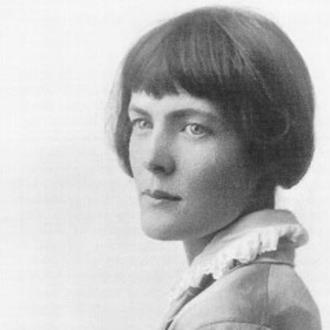Kami menggunakan cookie untuk meningkatkan pengalaman di situs web Bookmate dan rekomendasi kami.
Untuk informasi lebih lanjut, silakan baca Kebijakan Cookie kami.
Untuk informasi lebih lanjut, silakan baca Kebijakan Cookie kami.
Terima semua cookie
Pengaturan Cookie

H.D., Hilda Doolittle, was born on September 10, 1886, in Bethlehem, Pennsylvania. Her mother a Moravian, and her father an astronomer, she grew up to be what some have called the finest of all Imagist poets. Her accomplishments, though, extended far beyond her early Imagist poems. Her poetry, fiction, and non-fiction writings were published on both sides of the Atlantic, and her roles in a few early films also earned her praise. Most of the awards, including the Gold Medal from the American Academy of Arts and Letters, and the Brandeis and Longview Awards came late in her life, when her poetry had begun to break away from strict Imagism. Her days in Pennsylvania were spent among her family and extended family. As a young woman she began lifelong friendships with Marianne Moore and Ezra Pound. She met them both before and during her days at Bryn Mawr, but dropped out and found her way to England in 1911. Her romance with Ezra Pound had ended, but he had found his way to Europe before her and he introduced her to London's literary circles. In London she also met the novelist Richard Aldington, whom she married on October 18, 1913 in the borough of Kensington. The Imagists held three principles: direct treatment of the subject, allow no word that was not essential to the presentation, and follow the musical phrase rather than strict regularity in their rhythms. They began publishing circa 1908, and H.D.'s first published poems appeared in the journal Poetry in January 1913. ("Hermes of the Ways," "Orchard," and "Epigram.") Throughout her life she had adored all things Greek, and during this time she began to travel throughout Europe, and saw Greece for the first time. Her friends and associates included Ford Madox Ford and Amy Lowell, and her poetry appeared in the English Review, the Transatlantic Review, and the Egoist. And, thanks largely to Amy Lowell, she was introduced to audiences in the United States. She also began turbulent times during which her intense, but non-sexual relationship with D.H. Lawrence began, and her marriage became troubled. (Her novel "Bid Me to Live" is largely about this time.) She lived downstairs from her husband's mistress, and was introduced to a friend of the Lawrences, Cecil Gray, who became the father of her daughter, Frances Perdita. Known as Perdita, she was named for H.D.'s first great love and lifelong friend, Frances Gregg, and for the lost daughter of Hermione in Shakespeare's The Winter's Tale. She was born on March 31, 1919; H.D. had been very ill, but Bryher had come to her rescue. After the war, though, H.D. suffered a mental breakdown, and returned to Switzerland. She lived at Kusnacht, a clinic, and various hotels. She was now 60, yet was experiencing the most prolific writing years of her life. Now divorced from Aldington, they began a new friendship, and she remained legally Hilda Doolittle Aldington. The greatest awards of her career came in the fifties and sixties, during which time Bryher, now divorced, and Pearson took care of the legal and literary details of her life, leaving her free to write. However, in July 1961, while on the phone with her dear friend and physician, Dr. Heydt, she suffered a stroke. She remained perhaps semi-conscious while her writings continued to be published. She died on the 21st of September 1961, and was buried on Nisky Hill, back in Bethlehem, Pennsylvania, among her family. She was survived by Bryher, her daughter and son- in-law, her grandchildren, and many, many other family members and friends. She had written to Pearson, "I think I did get what I was looking for from life and art." Her gravestone lies flat in Nisky Hill Cemetary, Bethlehem, Penn., and usually has sea shells on it, left in tribute. It bears lines from her poem "Epitaph:" Hilda Doolittle Aldington Sept. 10, 1886-Sept. 27, 1961 "So you may say,/Greek flower; Greek ecstasy/reclaims forever/one who died/following intricate/lost m
lainnya
Kutipan
his praise sends pride through my veins like a dose of morphine.
- Sukai
- Komentar
- BagikanFacebookTwitterSalin tautan
- Laporkan
That smile is a fucking weapon capable of complete annihilation on my resolve.
- Sukai
- Komentar
- BagikanFacebookTwitterSalin tautan
- Laporkan
“If you end up in my handcuffs, it won’t be because I’m arresting you.”
- Sukai
- Komentar
- BagikanFacebookTwitterSalin tautan
- Laporkan
Kesan
🔮Kearifan Tersembunyi
💡Banyak pelajaran
tidak tersedia
- Sukai
- Komentar
- BagikanFacebookTwitterSalin tautan
- Laporkan
🎯Bermanfaat
👍Layak dibaca
tidak tersedia
- Sukai
- Komentar
- BagikanFacebookTwitterSalin tautan
- Laporkan
fb2epub
Seret dan letakkan file Anda
(maksimal 5 sekaligus)
